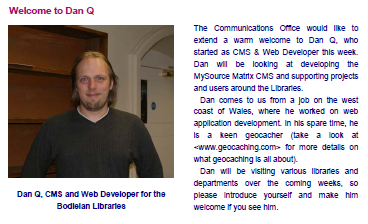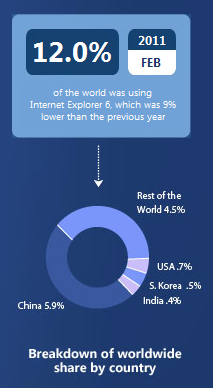I keep getting caught up on small world coincidences, since I started working at the Bodleian Library last week. I know about selective biases, of course, and I’ve always said that coincidences happen nine times out of ten, but this is really starting to feel like some kind of amazing conspiracy that I’ve somehow wandered into.
The most recent chain of connected coincidences is also probably the most impressive. But to explain it, I’ll need to take you back in time by almost three years. Back in the summer of 2008, I went to BiCon for the second time, accompanied by Claire and Matt P. Among the various other things we got up to, we met a young lady called Ann (who, if I remember rightly, got along very well with Matt).
This morning I received an email from Ann. It turns out that she works in the Bodleian Libraries: she’s likely to be one of the very users who it’s now my job to provide training and technical support to! She saw my photograph in the newsletter I mentioned in my last blog post and looked me up: small world! I emailed back, suggesting that we get together for a drink after work, and she agreed: great! She also asked if she could bring a friend along, a colleague from the library. Sure, I said, sounds good.
This lunchtime I sorted out some of my holiday entitlement for the rest of this academic year. I booked off a few days for a Three Rings “code week” in the summer, and a couple of days around the time that I’ll be moving house next month. One of these days clashed with a meeting that I’d had planned with the Web/Digital Officer of one of the libraries (I’m doing a grand tour of many of the libraries that comprise the Bodleian, in order to meet all the relevant people), so I sent an email to this staff member to ask if we could reschedule our meeting to another time.
“Okay,” they said, “But I think I’m meeting you in the pub in 90 minutes anyway…”
It turns out that the person whose meeting I’ve asked to reschedule is the friend of the person who recognised me from the staff newsletter, having originally met me three years ago. Out of all of the people (I’m not sure how many exactly – it’s probably in the staff handbook I haven’t read yet – but I’ll bet it’s a lot) that are employed by this, the largest university library in the UK, what are the odds?

















